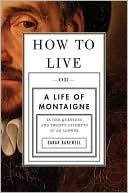More on this book
Community
Kindle Notes & Highlights
Read between
February 25 - March 15, 2017
Montaigne even went so far as to claim that true greatness of the soul is to be found “in mediocrity”—a shocking remark and even, paradoxically, an extreme one. Most moderns have been so trained to regard mediocrity as a poor, limited condition that it is hard to know what to think when he says this. Is he playing games with the reader again, as some suspect he does when he writes of having a bad memory and a slow intellect?
Montaigne distrusts godlike ambitions. For him, people who try to rise above the human manage only to sink to the subhuman.
Being truly human means behaving in a way that is not merely ordinary, but ordinate, a word the Oxford English Dictionary defines as “ordered, regulated; orderly, regular, moderate.” It means living appropriately, or à propos, so that one estimates things at their...
This highlight has been truncated due to consecutive passage length restrictions.
Alongside the wish to be happy, emotionally at peace and in full command of one’s faculties, something else drives people periodically to smash their achievements to pieces. It is what Freud called the thanatos principle: the drive towards death and chaos. The twentieth-century author Rebecca West described it thus: Only part of us is sane: only part of us loves pleasure and the longer day of happiness, wants to live to our nineties and die in peace, in a house that we built, that shall shelter those who come after us. The other half of us is nearly mad. It prefers the disagreeable to the
...more
How strange, reflected Montaigne, that Christianity should lead so often to violent excess, and thence to destruction and pain: Our zeal does wonders when it is seconding our leaning towards hatred, cruelty, ambition, avarice, detraction, rebellion. Against the grain, toward goodness, benignity, moderation, unless as by a miracle some rare nature bears it, it will neither walk nor fly.
“There is no hostility that exceeds Christian hostility,” he even wrote at one point. In place of the figure of the burning-eyed Christian zealot, he preferred to contemplate that of the Stoic sage: a person who behaves morally, moderates his emotions, exercises good judgment, and knows how to live.
There was indeed much of Stoic philosophy in the politiques. They did not urge revolution or regicide, but recommended acceptance of life as it is, on the Stoic principle of amor fati, or love of fate. They also promoted the Stoic sense of continuity: the belief that the world would probably continue to cycle through episodes of decay and rejuvenation, rather than accelerating into a one-directional rush towards the End. While the religious parties imagined the armies of Armageddon assembling in the sky, politiques suspected that sooner or later everything would calm down and people would come
...more
Montaigne reminded his contemporaries of the old Stoic lesson: to avoid feeling swamped by a difficult situation, try imagining your world from different angles or at different scales of significance. This is what the ancients did when they looked down on their troubles from above, as upon a commotion in an ant colony. Astrologers now warn of “great and imminent alterations and mutations,” writes Montaigne, but they forget the simple fact that, however bad things are, most of life goes on undisturbed. “I do not despair about it,” he added lightly.
I turn my gaze inward, I fix it there and keep it busy. Everyone looks in front of him; as for me, I look inside of me; I have no business but with myself; I continually observe myself, I take stock of myself, I taste myself … I roll about in myself.
“When all is said and done, you never speak about yourself without loss. Your self-condemnation is always accredited, your self-praise discredited.”
What he had first realized after his fall into unconsciousness was now amply confirmed: nature does everything for you, and there is no need to trouble your head about anything. It leads us by the hand, he wrote, as if “down a gentle and virtually imperceptible slope, bit by bit.” We hardly need to look where we are going.
Old age provides an opportunity to recognize one’s fallibility in a way youth usually finds difficult. Seeing one’s decline written on body and mind, one accepts that one is limited and human. By understanding that age does not make one wise, one attains a kind of wisdom after all.
Life should be an aim unto itself, a purpose unto itself.


